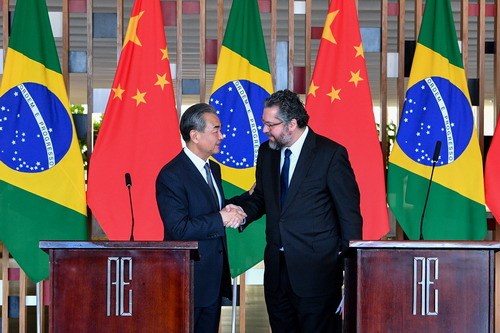
Chinese State Councilor and Foreign Minister Wang Yi (L) shakes hands with Brazilian Foreign Minister Ernesto Araujo at a press conference, on Thursday, July 25, 2019, in Brasilia. (Photo: China Plus)
Chinese and Brazilian foreign ministers have vowed to safeguard multilateralism while expressing the belief that their countries will have broad cooperation prospects.
At the third Foreign Ministers' Comprehensive Strategic Dialogue held in Brasilia on Thursday, State Councilor and Foreign Minister Wang Yi said that China and Brazil, as representatives of emerging economies and globally influential developing countries, are natural partners, which boast high complementarity and great cooperation potential.
China and Brazil should strengthen high-level exchanges, enhance political mutual trust and understand and support each other on issues concerning core interests and major concerns, Wang said.
China has always made the China-Brazil relationship a diplomatic priority and is willing to work with Brazil to take the 45th anniversary of their diplomatic ties as an opportunity to push their relationship to a new high, making it a model of unity and cooperation among emerging economies as well as a stabilizing force in promoting world peace and development, Wang said.
Appreciating Brazil's strong interest in jointly building the Belt and Road Initiative (BRI), Wang said China is willing to work with Brazil on how to synthesize the BRI and Brazil's Investment Partnership Program to deepen cooperation in agriculture, electricity, mining and infrastructure and promote an early execution of key projects, with technological innovation and digital economy as the new driving forces of growth.
Wang also said China and Brazil should jointly safeguard multilateralism, uphold the international system with the UN at its core, the international order based on international law, and the multilateral trading system represented by the World Trade Organization, and strengthen coordination and cooperation under such mechanisms as UN, BRICS and the Group of 20 (G20).
For his part, Brazilian Foreign Minister Ernesto Araujo said Brazil attaches great importance to the comprehensive strategic partnership with China, hails the great benefits brought to the two peoples by the development of the bilateral ties over the past 45 years, and will firmly adhere to the one-China policy.
Brazilian President Jair Bolsonaro looks forward to his visit to China in October, and sincerely welcomes Chinese President Xi Jinping's participation in the BRICS leaders' summit in Brazil in November, he said.
Praising the great progress achieved by China, Araujo said Brazil is optimistic about the prospects of bilateral cooperation.
Brazil welcomes China's expansion of investment in Brazil and is willing to explore ways of docking Brazil's Investment Partnership Program with the BRI to improve cooperation in agriculture, economy and trade, digital economy, infrastructure and anti-corruption, and increase exchanges in culture, education and tourism, he said.
He also said Brazil is committed to safeguarding multilateralism and free trade, building an open world economy, and promoting regional integration. Brazil hopes to strengthen coordination with China under such frameworks as UN and G20, to advance cooperation between Latin America and China, he said, adding that Brazil stands ready to coordinate closely with China to ensure a fruitful BRICS summit.


